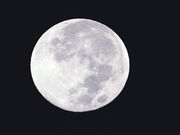Don't Blame Kids' Behavior on Full Moon
International study puts common myth to rest.
Many parents swear their children's behavior changes when the moon is full, but new research suggests otherwise.

"Our study provides compelling evidence that the moon does not seem to influence people's behavior," said expert.
To investigate possible effects of lunar cycles on human behavior, the researchers focused on those most vulnerable to changes in behavior and sleep habits: children.
In all, the study involved more than 5,800 kids from five continents.
"We considered that performing this research on children would be particularly more relevant because they are more amenable to behavior changes than adults and their sleep needs are greater than adults," said expert.
The children were from a wide range of socioeconomic and cultural backgrounds. The researchers considered their age, gender, size, nighttime sleep habits, level of physical activity and sedentary time. The education level of their parents was also taken into account.
The kids were tracked for 28 months, or 28 lunar cycles. During this time, the researchers divided the data they collected into one of three moon phases: full moon, half moon and new moon.
The study showed nighttime sleep duration was an average five minutes shorter around the time of a full moon than a new moon. The researchers found no other significant changes in behavior among any of the children.
"The only significant finding was the 1 percent sleep alteration in full moon, and this is largely explained by our large sample size that maximizes statistical power," expert said.
The researchers noted a five-minute reduction in the kids' sleep during a full moon doesn't pose a risk to their overall health.
"Overall, I think we should not be worried about the full moon. Our behaviors are largely influenced by many other factors like genes, education, income and psychosocial aspects rather than by gravitational forces," expert added.
More investigation is needed to determine if human biology is in sync with the cycles of the moon or if the moon has a greater effect on those with mental or physical health issues, the researchers noted.
Source: HealthDay News
- 316 reads
Human Rights
Ringing FOWPAL’s Peace Bell for the World:Nobel Peace Prize Laureates’ Visions and Actions

Protecting the World’s Cultural Diversity for a Sustainable Future

The Peace Bell Resonates at the 27th Eurasian Economic Summit

Declaration of World Day of the Power of Hope Endorsed by People in 158 Nations

Puppet Show I International Friendship Day 2020

